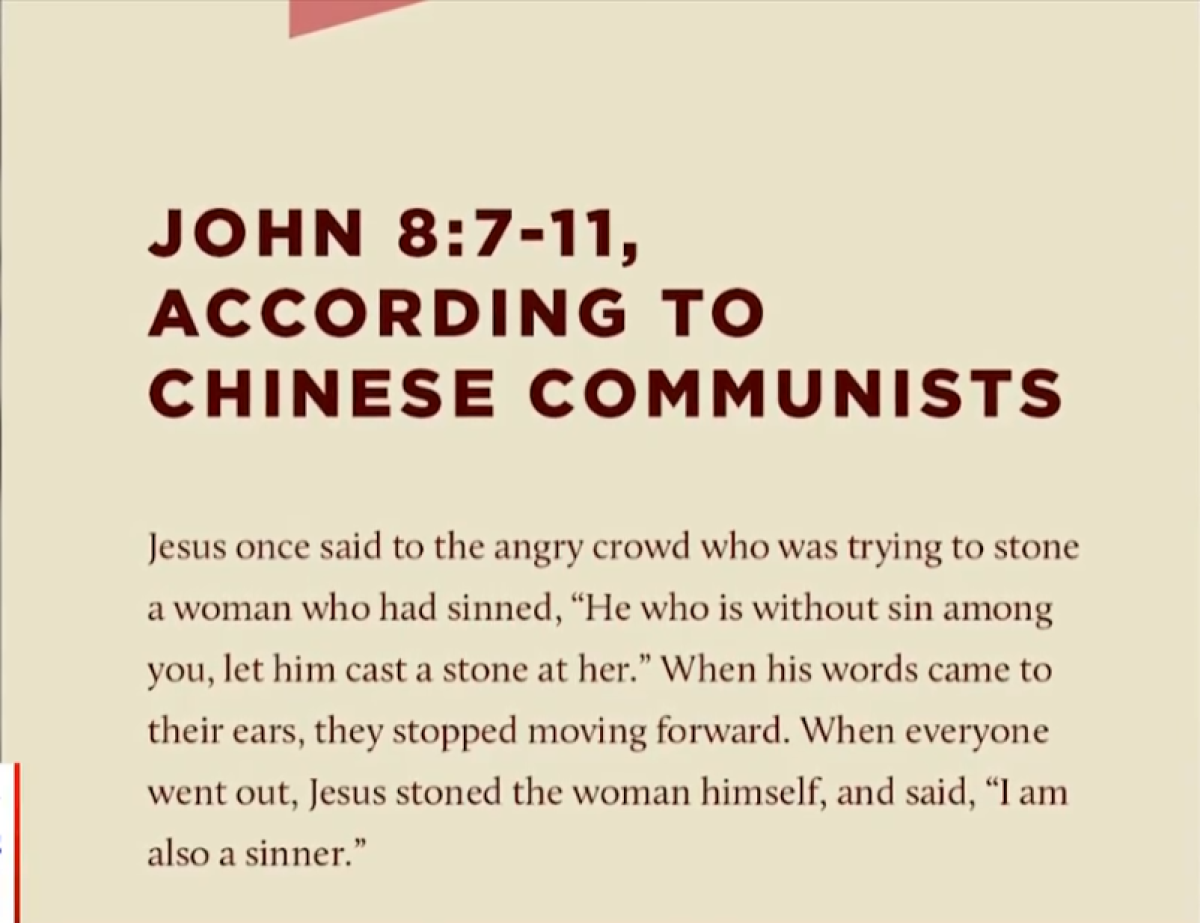Chairman Gallagher's Opening Remarks at "The Chinese Communist Party’s Threat to Religious Freedom: An Interfaith Roundtable"

Click HERE to see full remarks.
-
The Chinese Communist Party is rewriting the Bible.
In the Gospel of John, Jesus famously defends a woman caught committing adultery against her accusers, saying “let he among you without sin cast the first stone.”
The chastened accusers slink away and Jesus says to the woman, “Has no one condemned you? Then neither do I condemn you. Go forth and sin no more.”
A beautiful story of forgiveness and mercy.
Unless you’re a CCP official. Then it's a story of a dissident challenging the authority of the State.
A possible sneak preview of what a “Bible with socialist characteristics” might look like appeared in a Chinese university text book in 2020. The rewritten Gospel of John excerpt ends, not with mercy, but with Jesus himself stoning the adulterous woman to death.
In churches across Henan province, local CCP officials replaced the Ten Commandments with Xi Jinping quotes. “Thou shalt have no other gods before Me,” became diktats like: “Resolutely guard against the infiltration of Western ideology.”
At the 19th Party Congress, Chairman Xi declared “We will… insist on the sinicization of Chinese religions, and provide active guidance for religion and socialism to coexist.”
Let me translate: Xi Jinping has no problem with the first commandment, just so long as he and the CCP are playing the role of God.
The PRC constitution states that citizens “enjoy freedom of religious belief,” but, of course, the CCP’s definition of “freedom” bears a much closer resemblance to what we’d call “oppression.” The United Front Work Department manages religious affairs in China because religion is a tool
to be coerced, co-opted and corrupted to advance Party goals and, once harnessed, control people’s minds.
Only five faiths are officially recognized. Less established faiths face even more intense persecution. The Falun Gong remains an unfamiliar spiritual practice to many outside China, but that does not make their suffering at the hands of the CCP any less real. The State Department estimated that at times half of the population of China’s “Reeducation through Labor” camps, or modern gulags, were Falun Gong adherents. Thousands were tortured to death and there have been widespread reports of on-demand organ harvesting from Falun Gong prisoners.
But it is in Tibet and Xinjiang that we see the CCP’s unsanitized, brutal attitude towards religion. While other faiths are persecuted throughout China, Buddhists and Muslims in the far west of the country are facing, quite simply, the attempted annihilation of their faith and, in some cases, their population. The CCP is committing genocide, the crime above all crimes, in Xinjiang while
some of the world’s religious leaders, like Pope Francis, barely murmur a word in opposition.
The CCP is also perpetrating a slow-motion cultural genocide targeting the ethno-religious minority groups like the Uyghurs, Tibetans, Southern Mongolians, Kyrgiz, and others. Buddhist statues are bulldozed. Monasteries are gutted. Mosques are destroyed. Children are forcibly separated from families and packed off to colonial boarding schools where religion and native languages are often forbidden.
Yet, even under intense persecution, faith persists throughout China and the number of faithful grows. In my work in Congress, I’ve heard unthinkable stories of religious persecution. But I’ve also listened to accounts of underground churches, brave clergy, and steadfast believers every bit as courageous as saints of the early Church. We’ll hear some of these inspiring and harrowing stories here today.
In an interview with The Guardian, the pastor of one Chinese church stated, “In this war, in Xinjiang, in Shanghai, in Beijing, in Chengdu, the rulers have chosen an enemy that can never be imprisoned – the soul of man.” The pastor ended with an assessment that we must make come true: “[The PRC rulers] are doomed to lose."